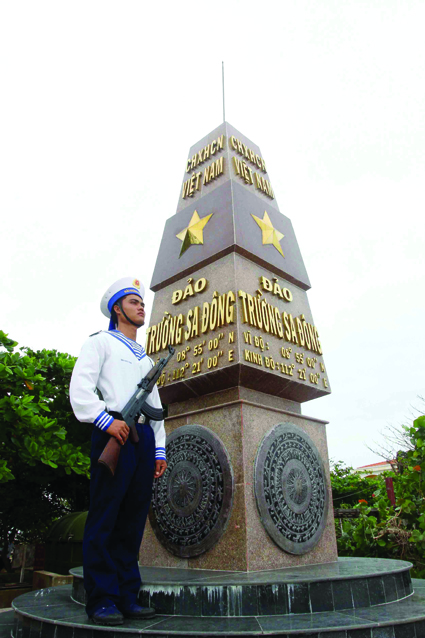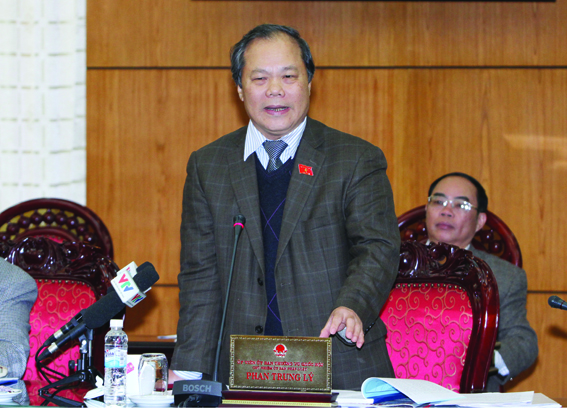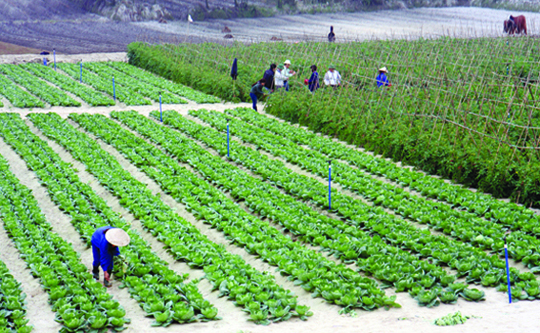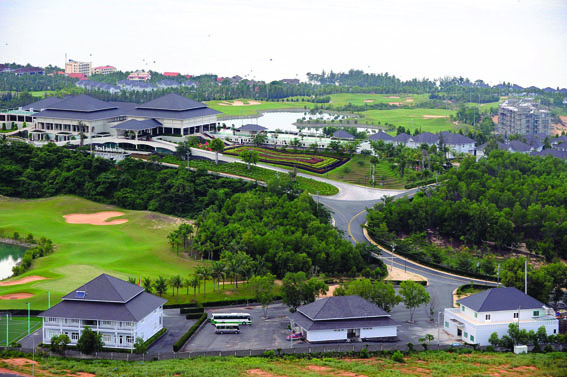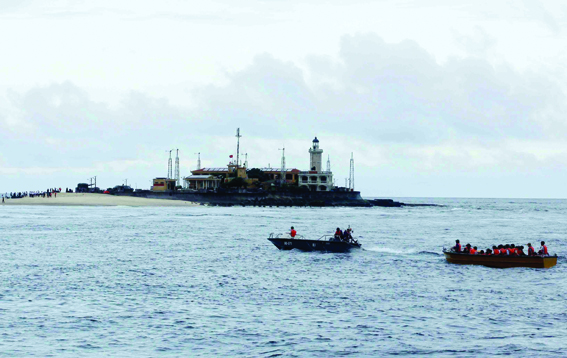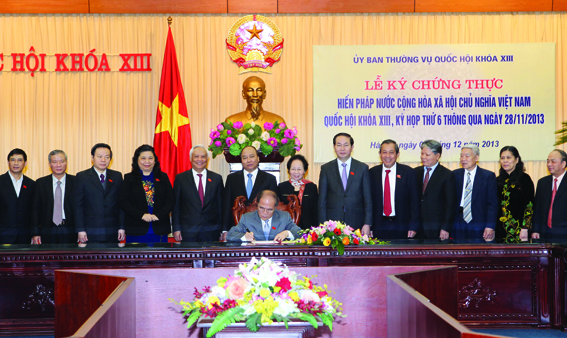Firstenacted in 1985, the Penal Code of the Socialist Republic of Vietnam has beenamended six times, including a comprehensive revision in 1999. It has become asharp tool of the State in social management, crime prevention and combat aswell as maintenance of political security, social order and safety. However, thecurrent Penal Code proves to be insufficient in the new period when the countryembarks upon vigorous development of the market economy and extensive andintensive international integration, and thus needs substantial andcomprehensive revision.

hearing for Asia Commercial Bank case__Photo: Doan Tan/VNA
The necessity to revise the Penal Code
Over the past time, the crime situation has seen complicated developments with the appearance of many new and serious crimes. In face of the above situation, the current Penal Code reveals such constraints as:
(i) Signs of crime and penalty determination are unclear and unspecific for many crimes, which cause not a few difficulties to crime investigation and proving;
(ii) Many provisions are of “qualitative” character, causing difficulties to their guidance as well as investigation, prosecution and adjudication work;
(iii) Penalty frames established for a number of crimes are rather wide, leading to the inconsistent imposition of specific penalties in many cases and causing public doubts about the justice done by procedural bodies;
(iv) Penal liability is prescribed only for individuals, but not legal persons. Realities show that many organizations or enterprises (legal persons) have been left unpunished when, they, in seeking profits at the expense of the safety, lives and health of communities, have committed serious violations such as destruction of environment, speculation, tax invasion, smuggling, or breaches of the regulations on banking and securities activities, environmental protection or labor safety.
The vigorous developments in the economic, political, social and diplomatic fields have also posed important requirements for revision of the Penal Code.
First, the Vietnamese State has, since 2000, carried out the judicial reform in the spirit of the Resolution of the Xth National Congress of the Communist Party of Vietnam and various resolutions of its Political Bureau. The Party has clearly pointed out in these resolutions the necessity “to attach importance to the improvement of criminal policy and judicial procedures; to uphold the effectiveness of prevention and the inclination to the good in the handling of criminal offenders; to reduce imprisonment penalties, expand the application of fines and non-custody reform for some types of crimes; to restrict the application of death penalty to only a number of especially serious crimes; to lower the too high maximum penalties against some types of crimes; to address the criminalization of economic and civil relations and omission of crimes; to establish as crimes socially dangerous acts which have emerged in the process of socio-economic, scientific and technological development and international integration”; and at the same time “to punish more severely law enforcement officials and those who abusing their positions and powers to commit crimes.” These are important orientations for the study and revision of the Penal Code in order to institutionalize the Party’s and the State’s new points of view on criminal policy in the current situation.
Second, in furtherance of the “doi moi” (renewal) policy initiated in 1986 by the Communist Party of Vietnam, focusing on the economic renewal, a socialist-oriented market economy has gradually taken shape in Vietnam and developed with important achievements. After nearly 30 years of “doi moi”, Vietnam’s economic model has been affirmed by the Party at its XIth national congress as “a multi-sector commodity economy operating under the market mechanism with the State’s management under the leadership of the Communist Party. This is a form of the market economy which follows the laws of the market economy on the one hand and is based on, led and governed by, the socialist principles and nature.” This requires the legal system in general and the Penal Code in particular to institutionalize these viewpoints and ideas in order to make the Penal Code an effective legal instrument for protection and promotion of the proper development of the socialist-oriented market economy.
As a product of the period of transition from the centrally planned and subsidized economy to the socialist-oriented market economy, the 1999 Penal Code fails to serve as an effective tool to protect and spur the healthy development of the socialist-oriented market economy factors. Many of its provisions prove no longer suitable to the development of the market economy, such as those on the crimes of “speculation” (Article 160); and “deliberately acting against the State’s regulations on economic management, causing serious consequences” (Article 165). Not a few crimes emerging in the process of operating the economy under the market mechanism have been neither timely nor sufficiently supplemented, such as crimes related to insurance, tax, finance, securities, natural resources, and food hygiene and safety. Such limitations have exerted no little impacts on economic development as well as the effectiveness of crime prevention and combat. This requires the renewal of thinking in the revision of the Penal Code so as to create a safe, transparent and open legal corridor for enterprises and citizens to participate in economic development; to promote the creativity of different economic sectors in their production and business activities; and to maintain a sound competitive environment while severely punishing abuse of positions and powers to intervene in the economic process.
Third, the development of human rights and citizens’ fundamental rights in the newly revised Constitution demonstrates a new thinking in the recognition and guarantee of these rights. It provides in Article 14: “ In the Socialist Republic of Vietnam, human rights and citizens’ rights in the political, civil, economic, cultural and social fields shall be recognized, respected, protected and guaranteed in accordance with the Constitution and law. Human rights and citizens’ rights may not be limited unless prescribed by a law solely in case of necessity for reasons of national defense, national security, social order and safety, social morality and community well-being.”
Yet, realities show that these rights of people, particularly vulnerable groups in the society, have not been fully respected and guaranteed now and then or here and there in investigation, prosecution or adjudication activities. Generally, people have not yet felt safe in their living environment with environmental pollution, food contamination, labor accidents and traffic accidents reaching alarming levels. They also cannot feel at ease in promoting their creativity in production and business activities or actively participating in crime prevention and combat.
It is therefore necessary to further improve the Penal Code for the better protection of people’s living environment, the better protection of human rights and democratic freedoms of citizens, the protection of lawful rights and interests of not only the victims but also the criminal offenders, and for the mobilization of people to participate in the crime prevention and combat as well as in economic development.
Fourth, proactive international integration has become Vietnam’s internal need. The nation has joined various international or regional organizations and acceded to different multilateral treaties, including many crime-related conventions like the three UN conventions on prevention and combat of narcotic drugs; the Convention against Organized Transnational Crime and its Protocol to Prevent, Suppress and Punish Trafficking in Persons, especially Women and Children; the Convention against Corruption; and terrorism-related treaties. In its bilateral relations, Vietnam has concluded many mutual legal assistance and extradition agreements with other countries.
However, in the course of international integration, Vietnam has faced not a few difficulties and challenges, especially international crimes. Since organized transnational crimes and crimes committed by foreigners have not been fully and comprehensively dealt with by the current Penal Code, Vietnam lacks adequate and favorable legal grounds for stepping up international cooperation against these crimes. As a result, the Penal Code needs to be revised to incorporate the provisions of multilateral and bilateral crime-related treaties which Vietnam has concluded.
Major orientations for revision of the Penal Code
The revision of the Penal Code this time aims to make it an effective legal tool for preventing and fighting crime in the conditions of building a law-ruled socialist state in the period of national industrialization and modernization and international integration, contributing to the protection of the regime, human rights and lawful rights and interests of citizens, the proper development of the market economy and the maintenance of social order and safety, creating a safe and healthy social and ecological environment for all the people. To this end, the new Penal Code needs to be studied and elaborated on the basis of the following six major orientations:
1. To institutionalize criminal policy for the protection and promotion of the socialist-oriented market economy
This orientation aims to basically redress the inadequacies of the 1999 Penal Code, which have hindered the development of the market economy, and to establish a synchronous legal framework for the market economy to operate in accordance with its laws and along the socialist orientations; to protect the equality among different economic sectors; and to establish transparent regulations for stimulating all stakeholders to participate in economic activities. Specifically:
First, to study the decriminalization of a number of crimes established in the current Penal Code in light of the context of developing the socialist-oriented market economy, and concurrently the criminalization of a number of socially dangerous acts which seriously hinder or affect the healthy, stable and sustainable development of the economy.
It is necessary to abolish the crime of “deliberately acting against the State’s regulations on economic management, causing serious consequences” (Article 165); to abolish, or define more clearly the constitutents of, the crimes of “conducting business illegally” (Article 159); “usury” (Article 163); and “counterfeiting stamps and tickets, trading in counterfeit stamps and tickets” (Article 164).
Meanwhile, the establishment of new criminal offenses in the fields of land administration, insurance, bidding, and food hygiene and safety needs to be studied, while amendments should be made to increase fines and penalties of economic nature for crimes of breaking the economic management order.
Second, to revise provisions on penalties and judicial measures against economic crimes toward increasing the imposition of fines (either principal or additional penalty), aiming to raise the deterrent effect and reduce the rate of recidivism. Higher fines should be extended to serious crimes or even to extremely serious crimes. Meanwhile, provisions on judgment enforcement should also be revised so as to increase the deterrent effect and the effectiveness of the application of fines or other material penalties. Study needs to be conducted on the application of such judicial measures as confiscation of money and property; ban from holding certain positions, practicing certain professions or performing certain jobs related to economic activities, or on the conversion of fine (as a principal or additional penalty) into imprisonment penalty when criminal offenders deliberately refuse to pay fines or disperse and conceal their property, causing difficulties to judgment enforcement activities.
2. To improve criminal policy toward upholding the effectiveness of prevention and inclination to the good in the handling of criminal offenders; respecting and guaranteeing human rights and fundamental rights and obligations of citizens
This orientation demonstrates the humane policy of the Party and the State in the handling of criminal offenders. The heightening of the effectiveness of prevention and inclination to the good in the handling of criminal offenders and the respect for and guarantee of human rights and fundamental rights and obligations of citizens in the spirit of the 2013 Constitution consist in the following aspects:
First, to study the reduction of the application of imprisonment penalty while expanding the scope of application of non-custodial penalties such as fine and non-custodial reform. These two issues are organically interrelated. The humanity in criminal policy demonstrates primarily in the reduction of harsh penalties, including imprisonment, against criminal offenders. To this end, revision should be made toward inflicting the imprisonment penalty mainly on those who commit very serious or especially serious offenses or on those who commit serious or less serious crimes when knowing that they will continue causing harms if they are let free in the society. So, study should be made on the non-application of imprisonment penalty for less serious offenses and unintentional serious crimes, on the expansion of the application of fine and non-custodial reform to those crimes and on the imposition of fine for the crimes of infringing upon economic management order, public order and safety and some other ownership-related crimes.
Second, to study the addition of conditions for application of death penalty in the direction of imposing this penalty only for especially serious crimes of barbarous and cruel nature (such as barbarous murder, murder for property plundering, rape and murder, murder for despicable motive); for threatening the survival of the nation (some crimes of infringing upon the national security and infringing upon the duties and responsibilities of army men); for seriously threatening social order and safety and the development of race (some drug-related crimes); and for crimes of global nature, jeopardizing international peace and security (terrorism, corruption, sabotage of peace, crimes against mankind and war crimes). On that basis, to study the reduction of the Penal Code’s articles and clauses on specific crimes subject to death penalty, and at the same time to study provisions on postponement of the execution of death penalty in order to reduce it in reality.
Third, to extend the application of the provisions on exclusion of penal liability in the current Penal Code such as Clause 4 of Article 8 (Non-criminal acts); Article 11 (Unexpected events); Clause 1 of Article 15 (Legitimate defense); and Clause 1 of Article 16 (Urgent circumstances). Besides, in many cases persons commit socially dangerous acts not due to their fault as they perform such acts under the instructions or orders of their superiors or such acts cause harm due to professional risks in the course of production, scientific or technological tests, or during the arrest and detention of criminal offenders caught red-handed or under pursuit warrants. Therefore, current provisions on this issue should be amended while new ones should be added to exclude penal liability for these cases in order to create a safe legal corridor for people to participate in production activities or scientific research of “breakthrough” nature for common interests, and in the crime prevention and combat.
Fourth, to improve provisions on exemption from penal liability; exemption from or reduction of penalties; and remission of criminal records, aiming to create conditions for convicts, particularly those who are sent to prison, to reintegrate themselves in the community. First of all, to prescribe more specific and clear conditions for penal liability exemption and at the same time to study the further expansion of cases of penal liability exemption. Furthermore, the conditions for exemption from penalties should be defined more specifically and the provisions on remission of criminal records for those who have committed many crimes or for those sentenced to life imprisonment or death penalty after they enjoy amnesties should be added.

Fifth, to improve the criminal policy relating to minors in conformity with the United Nations Convention on the Rights of the Child, such as the principles of handling minor offenders, toward guaranteeing to the utmost their interests; creating mechanisms for better protection of minor victims; limiting penal liability examination for minors between full 14 and under 16 years old, who are considered criminals only when they commit certain crimes prescribed in the Penal Code’s Part on Crimes. Also to study the restriction of the application of imprisonment penalty to minors on the basis of setting stricter conditions for application; the increased application of non-custody penalties to minors between full 16 and under 18 years old who commit less serious or serious crimes, or minors between full 14 and under 16 years old who commit very serious crimes; and the addition of provisions on conditional release ahead of time for minor offenders, helping them early return to the community. To study the addition of non-criminal measures applicable to minor offenders. To adopt a policy on harsher punishment of crimes against children, such as violence against children; trafficking of children; and sexual abuse of children.
3. To renew thinking on crime, penalty and grounds for penal liability to meet the requirements of crime prevention and combat in the new situation
First, to study the establishment as crimes of a number of socially dangerous acts which have recently emerged, such as exploiting child labor; establishing or joining criminal gangs; appropriating and illegally trading in human organs and fetuses; failing to pay insurance premiums for workers; embezzling social insurance money, or abusing positions and powers to appropriate social insurance money of workers, or forging documents for illegal enjoyment of social insurance benefits.
Second, to revise the Penal Code toward defining the penal liability of legal persons. It is high time to add provisions on penal liability of legal persons in order to handle economic organizations (legal persons) that commit criminal offenses, such as speculation, tax evasion, illegal business, smuggling, or violating regulations on environmental protection and labor protection, which cause serious consequences. This also aims to better satisfy the requirements of the 40 recommendations against money laundering of the Financial Action Task Force (FATF).
Third, to revise the Penal Code in the direction that crimes and penalties could be prescribed not only in the Penal Code but also in specialized laws, aiming to create greater flexibility for the fight against new crimes, to raise the deterrent effect against offenders while ensuring the necessary stability of the Penal Code, reducing pressure for its constant revision. The establishment of specific crimes in specialized laws must be based on and in accordance with the provisions in the Penal Code’s General Part.
4. To study the incorporation into domestic law of relevant provisions of international treaties which Vietnam has acceded to
This orientation aims to facilitate the performance of international obligations in international treaties to which Vietnam is a contracting party, particularly treaties related to crime prevention and combat, such as the Convention against Organized Transnational Crime and its Protocol to Prevent, Suppress and Punish Trafficking in Persons, especially Women and Children, the Convention against Corruption, etc.; and to create a favorable legal basis for enhancing international cooperation in crime prevention and combat. It is therefore necessary to study the criminalization of acts of participating in organized criminal gangs; to amend provisions on the crimes of human trafficking and trafficking in, fraudulently changing or appropriating children by clearly defining these criminal offenses in line with the said Protocol; to add criminal offenses of trading in, brokering the trade in, and appropriating, human organs or fetuses; and at the same time to study the consolidation of the crime of harboring and consuming property acquired through crime commission and the crime of money laundering, as both are in nature acts of money laundering.
5. To amend the Penal Code’s provisions on crimes of corruption to meet the requirements of corruption prevention and combat
Though many measures have been taken to detect, prevent and handle acts of corruption, there remain many limitations in the corruption prevention and fighting, largely due to the inadequacies of the legal system. Therefore, the Penal Code’s provisions on crimes of corruption need to be amended toward criminalizing acts of corruption in accordance with the United Nations Convention Against Corruption (UNCAC), such as bribing foreign officials, bribery in the private sector and embezzlement of property in the private sector. Meanwhile, it is necessary to specify the conditions for penalty exemption or reduction for corrupted persons who actively report acts of corruption prior to detection, and redress the consequences of their acts. Besides, it is also necessary to study the criminalization of acts of “illicit enrichment” in conformity with the UNCAC.
6. To improve the criminal legislation techniques toward raising the transparency, feasibility and foresee ability of the provisions of the Penal Code; ensuring technical uniformity between the General Part and the Part on Crimes of the Penal Code and between the Penal Code and other laws.
This orientation aims to create a new face for the legislative technique used in the Penal Code on the basis of addressing technical problems and inheriting the technical advances of the 1999 Penal Code. It is, therefore, necessary to prescribe specifically, clearly and strictly the signs for determining crimes and penalty frames, helping clearly distinguish criminal acts from non-criminal acts; distinguishing one criminal act from others, thus facilitating their application; and concurrently to narrow the range between the minimum and maximum penalties, ideally from 3 to 5 years on average, for a number of crimes, and arrange the penalty frames in a scientific and synchronous manner.- Tran Van Dung, LL.D (Criminal and Administrative Law Department - Ministry of Justice)
